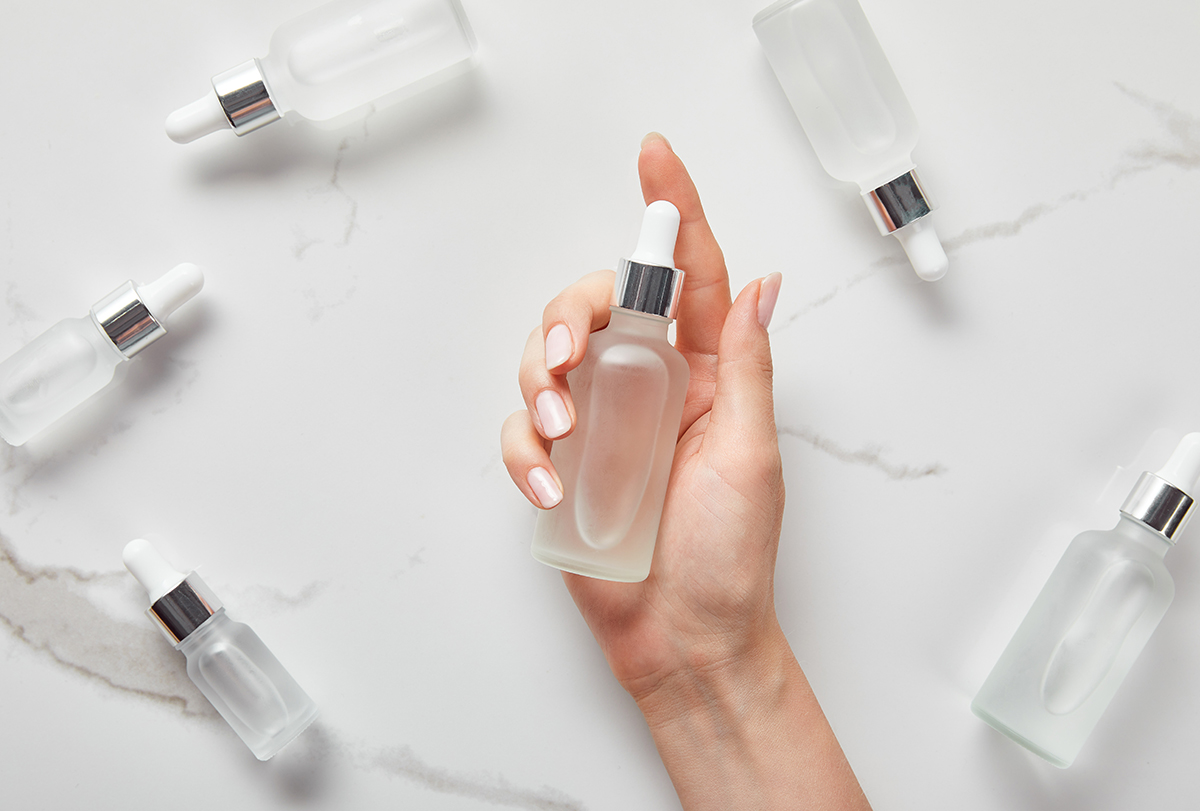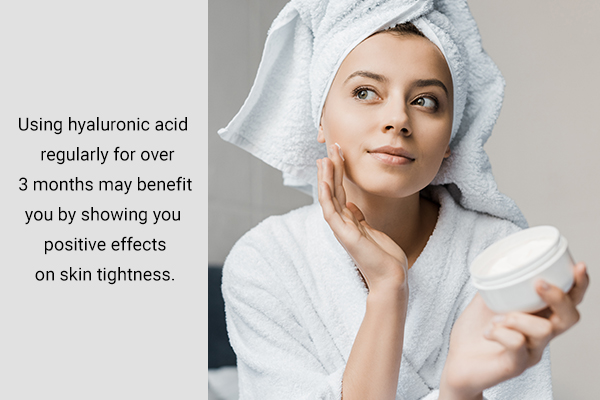In this article:
Hyaluronic acid is a biochemical that is found naturally in the body. It is a group of sugar molecules called polysaccharides, found in your eyes and joints. It is well-known in the skin care world because of its rich various benefits, one of which is enhancing the production of collagen.

Collagen is a protein that keeps your skin looking youthful and flexible. When you age, you undergo a reduction of collagen levels. This makes the skin lose its flexibility, which ultimately leads to the formation of fine lines and wrinkles. So, collagen production is a boon for skin health!
You can easily find hyaluronic acid as an active ingredient in serums and cleansers.
Hyaluronic acid also has other benefits, which include moisturizing the skin, plumping the skin, and making fine lines and wrinkles less visible. (1)(2)
Read on to take a deeper look at hyaluronic acid, how you can use it, and other benefits of using hyaluronic acid.
Does Hyaluronic Acid Increase Collagen in the Skin: What Is the Evidence?
The body stimulates collagen production inherently, but factors such as age can cause the quantity and quality of collagen to deteriorate.
Several approaches are available that can help boost collagen production. One of the most commonly used therapies is the use of hyaluronic acid. Hyaluronic acid is famous for the role it plays in promoting collagen production.
Research has found that when wounds in mice were given hyaluronic acid treatment, they showcased an improvement more than those cared for with water. This is because the levels of two kinds of collagen were increased in the region around the wounds treated with hyaluronic acid. (3)
Not only this, but filler treatments that are done by dermatologists to reduce fine lines also contain hyaluronic acid. Studies have established that a mixture of hyaluronic acid and purified polynucleotide supports and boosts the quantity and quality of collagen in the skin while also enhancing skin flexibility. (4)
So, yes! It is safe to conclude that regular use of hyaluronic acid is beneficial for improving collagen production.
What Are the Other Benefits of Using Hyaluronic Acid?

Here’s why you should include hyaluronic acid in your skin care regimen.
1. Facilitates smooth movement
Hyaluronic acid is important to help your joints work smoothly as it facilitates joint movement and reduces pain. It behaves as a lubricant and prevents the bones from rubbing against one another.
Thus, hyaluronic acid can provide therapeutic effects to those who suffer from knee osteoarthritis. (5)
2. Hydrates the skin
The most well-known advantage of hyaluronic acid is hydration due to its proficiency in retaining moisture.
Keeping the skin hydrated is very important because, if the skin is not hydrated enough, the skin barrier breaks, leaving your skin prone to damage. To hydrate the skin efficiently, applying products with hyaluronic acid is a great option. (1)
3. Makes the skin look youthful
Hyaluronic acid is fundamental to young-looking skin. It can retain 1,000x its weight in water. It’s this moisture-holding quality that makes hyaluronic acid an immensely effective component of skin care products.
Hyaluronic acid plumps up the skin and therefore reduces the appearance of fine lines, giving your skin a youthful look. It safeguards the skin from free radicals, which are damaging to your cells and accelerate aging. (1)
4. Makes the skin flexible
Hyaluronic acid is known for improving skin flexibility and elasticity, thus making your smooth. This is also why it reduces the formation of wrinkles and fine lines. In addition, for the skin to feel supple, it is important to keep it flexible and moisturized. (6)
5. Supports wound healing
Hyaluronic acid helps in speeding up the healing of wounds. It does so by lessening inflammation and facilitating the regeneration of cells, which is important for wound recovery. (7)
6. Reduces wrinkles
Hyaluronic acid promotes collagen production, which is necessary for maintaining the skin’s structure and firmness. Its other actions including anti-inflammatory, skin-plumping, and scavenging free radicals also play roles in avoiding wrinkles and fine lines. (8)
How Long Does It Take for Hyaluronic Acid to Show Positive Results?

According to a German study, regularly using hyaluronic acid, such as that present in antiwrinkle creams, for over 3 months may show positive effects on skin tightness. (8)
Points to remember: Prescription hyaluronic acid preparations should be taken strictly as advised by your healthcare provider.
How Should I Use Hyaluronic Acid on My Face?
Hyaluronic acid is commonly available in moisturizers and serums. You can incorporate them into your skin care regimen in the following ways.
Moisturizers containing hyaluronic acid
- Gently clean your face with a cleanser that is suitable for your skin type.
- Pat your skin dry.
- Apply a serum, if you use any.
- Apply the hyaluronic acid moisturizer by massaging it gently in circular motions.
- Use it twice a day.
Serums containing hyaluronic acid
- Cleanse your face well to get rid of any dirt or debris.
- Pat your skin dry but leave the skin slightly damp.
- Dab the hyaluronic acid serum on your damp skin.
- Apply a moisturizer immediately afterward.
Who Should Avoid Using Hyaluronic Acid on Their Face?

According to skin care experts and dermatologists, hyaluronic acid is great for any skin type, even sensitive ones. Even people who are susceptible to breakouts can use hyaluronic acid.
Your dermatologist can give you advice and suggestions on which hyaluronic acid product to use based on your skin type or problem.
Most-Asked Questions About Hyaluronic Acid for Skin
Is hyaluronic acid considered safe for use?
Research shows that hyaluronic acid is safe to use. Side effects from the use of hyaluronic acid are not very common. It’s also deemed to be okay for use in pregnancy or during nursing. (9)
Can I use hyaluronic acid daily?
Yes, if it suits your skin, you can use hyaluronic acid daily. Studies have demonstrated the use of hyaluronic acid serum twice every day with positive results and no noted adverse effects. (10)
Do I apply hyaluronic acid to wet or dry skin?
Skin care experts recommend you use hyaluronic acid serum on slightly damp skin after proper cleansing.
Why is collagen good for the skin?
Collagen is useful for the skin because it:
- Keeps the skin smooth, soft, and firm
- Promotes skin cell regeneration
- Promotes skin repair
- Improves skin elasticity
- Prevents wrinkles and fine lines
Final Word
Hyaluronic acid works by repairing and hydrating the upper skin layers. It is a very gentle skin ingredient with no noted adverse effects. You may check in with a professional if you experience allergic reactions after its use.
The hydrating properties of hyaluronic acid make it great for those with dry skin. It also improves the texture of the skin by decreasing inflammation and evening out uneven patches on the skin. Including hyaluronic acid in your skin care regimen will keep your skin moisturized and radiant.
- Was this article helpful?
- YES, THANKS!NOT REALLY


